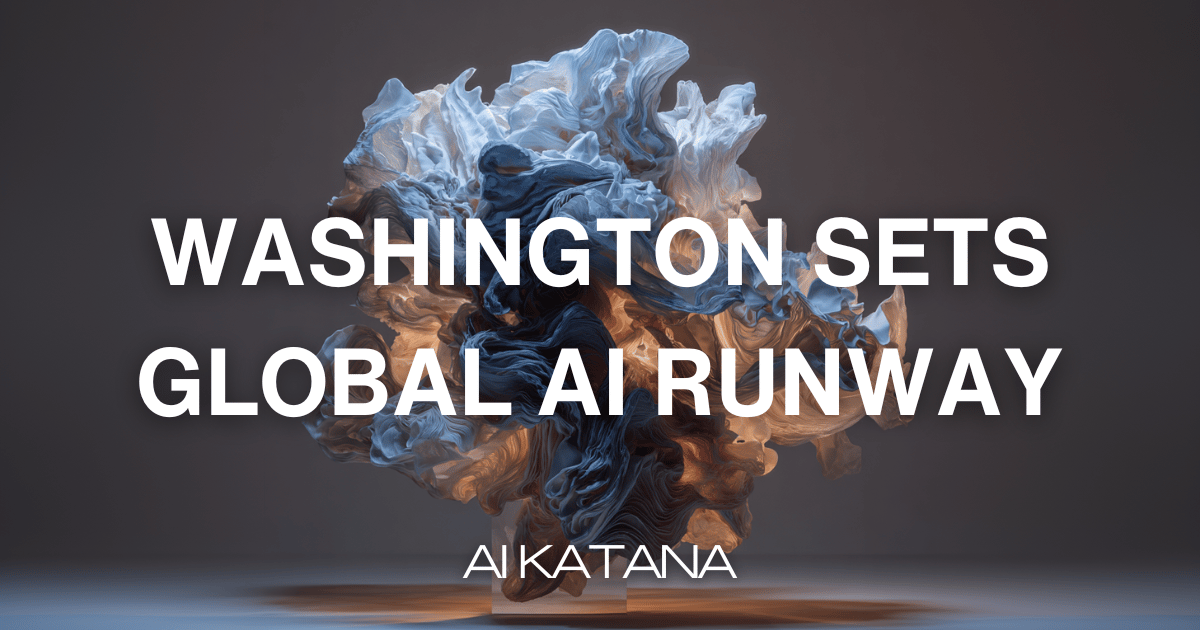- AI KATANA
- Posts
- Washington sets global AI runway
Washington sets global AI runway
Also: Google model wins math gold

Hello!
A fast-moving 24 hours has delivered a potent mix of policy, product and capital moves in the AI arena. Washington is poised to debut an AI Action Plan that will yank federal funding from states with restrictive laws while bundling U.S. chips, models and data-center expertise for export. Microsoft fanned the talent war by luring a platoon of DeepMind veterans, even as Windows 11’s latest build scattered Copilot automation across the desktop. On the capital side, xAI is lining up a mammoth debt raise for a GPU super-cluster, while Lightspeed’s cheque for Composio shows VCs still love middleware plays. Rounding out the day: Google’s language model solved Olympiad-level maths, Amazon snapped up a wrist-based “listening” wearable, and the UN reminded everyone that green electrons—not just faster GPUs—will decide AI’s future.
Sliced just for you:
🚀 Washington sets global AI runway
🤖 Microsoft raids DeepMind talent
🧮 Google model wins math gold
🎧 Amazon buys Bee AI wearable
🌴 Goa unveils AI Mission 2027
♻️ UN chief tells AI sector to go green
The forthcoming national AI Action Plan will withhold federal funds from U.S. states that impose tough testing or liability rules, direct the FCC to pre-empt conflicting statutes, and launch “full-stack” export packages combining open-source models, computing hardware and fast-tracked data-center permits. Pentagon adoption is baked in, and the document marks a sharp pivot from the previous administration’s cautious stance. A prime-time speech at the “Winning the AI Race” event will unveil final details later today.
Microsoft has hired more than twenty senior engineers from DeepMind. Flagship recruit Amar Subramanya, ex-Gemini engineering lead, now reports to DeepMind co-founder Mustafa Suleyman, who runs Microsoft’s consumer-AI push. New teammates Sonal Gupta, Adam Sadovsky and Tim Frank will build agentic chatbots and productivity tools, with compensation reportedly rivaling Meta’s nine-figure offers. Google says attrition remains below norms, yet analysts see the exodus as a warning shot in the race to own generative AI across assistants, search and healthcare.
Google’s latest language-model ensemble translated Olympiad problems into conversational steps, hitting 96 % accuracy and earning first place at a global mathematics contest, just ahead of an OpenAI entry. Judges praised its self-narrated proofs, and Cambridge mathematician Timothy Gowers called the feat a “Rosetta Stone moment” that could push AI toward solving open conjectures. Plans are under way to expose the system via APIs for researchers and educators, though formal verification remains a hurdle.
Amazon has acquired Bee, creator of a coin-sized wearable that passively captures ambient speech to craft personalised daily briefings. The gadget processes audio on-device and uploads only anonymised embeddings, a privacy posture Amazon says it will keep as Bee staff join its Devices & Services group. Observers see the move as positioning Amazon for wrist-first agentic AI commerce, mirroring Meta’s Ray-Ban strategy.
India’s smallest state has launched a four-year plan to embed AI across governance. A new agency will roll out multilingual service chatbots, AI-ready school curricula and smart waste-collection routes, funded by a tech levy on tourism and a ₹500 crore co-investment fund. Targets: 50 000 skilled jobs and a 20 % boost to non-tourism GDP. Success hinges on rural connectivity and privacy law, but the blueprint could become a template for other states.
UN Secretary-General António Guterres says AI data centers could consume Japan-scale electricity by 2030. He urged every major tech firm to hit 100 % renewable power within five years, publish audited energy metrics and design for efficiency, noting that the same models straining the grid can also optimise it. The call is expected to inform impending UN disclosure rules for AI infrastructure and chip supply chains.
🛠️ AI tools updates
Microsoft’s new Windows 11 build turns Copilot into an OS-wide layer: Copilot Vision scans whatever is on-screen and answers natural-language queries, while Snapdragon-based Copilot Plus PCs gain a Settings agent, Click-to-Do gestures, Paint sticker generation and AI photo lighting. Non-AI perks include a precision screenshot tool. The rollout will land via Store updates over the next month, nudging Windows toward a persistent multimodal AI shell.
Parasoft’s update lets testers spin up full API mocks by chatting in natural language. The agentic assistant autogenerates virtual services, adds LLM-aware validation for unpredictable outputs and supports the new Model Context Protocol to test multi-agent workflows. Parasoft claims environment-setup time drops 80 % and brings shift-left testing to non-coders. All features ship today across Virtualize and SOAtest suites.
💵 Venture Capital updates
xAI is working with Valor Equity to secure up to $12 billion in debt—one of the largest financings ever for an AI startup—to buy Nvidia GB200/GB300 GPUs for a new super-cluster that will dwarf its current 230 000-GPU rig. Lenders want a three-year payback and borrowing caps, while Musk says the move avoids equity dilution as xAI races for compute scale.
Infrastructure startup Composio raised $25 million to build a “shared learning layer” that lets AI agents share experience across deployments. Lightspeed led the round with participation from Vercel’s Guillermo Rauch, HubSpot’s Dharmesh Shah and others, bringing total funding to $29 million. Proceeds will deepen reinforcement-learning pipelines and expand integrations with LangChain, Supabase MCP and OpenAI Agents. Over 200 enterprises already use its SDK.
🫡 Meme of the day

⭐️ Generative AI image of the day

Before you go, check out ‘Saiyaara’ meme fest sparks AI jokes.
